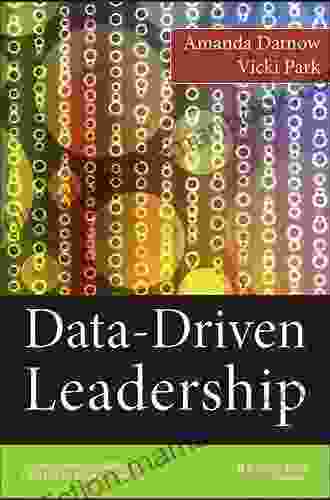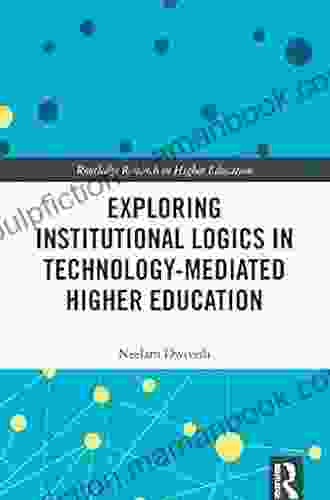Exploring Institutional Logics for Technology-Mediated Higher Education

The advent of technology has significantly transformed higher education, enabling new modes of teaching, learning, and institutional operation. However, the integration of technology into higher education institutions (HEIs) is not merely a matter of adopting new tools; it also involves grappling with the complex interplay of institutional logics that shape how technology is perceived, used, and valued within these institutions.
Institutional Logics in Higher Education
Institutional logics are the normative beliefs and values that guide the behavior and actions of individuals within organizations. They provide a shared understanding of what is considered legitimate and appropriate within an institution. In higher education, three primary institutional logics have been identified:
4.4 out of 5
| Language | : | English |
| File size | : | 5173 KB |
| Text-to-Speech | : | Enabled |
| Enhanced typesetting | : | Enabled |
| Word Wise | : | Enabled |
| Print length | : | 224 pages |
| Screen Reader | : | Supported |
- Academic logic: Emphasizes knowledge creation, intellectual rigor, and academic freedom.
- Managerial logic: Prioritizes efficiency, accountability, and resource optimization.
- Market logic: Focuses on competition, customer satisfaction, and revenue generation.
Technology-Mediated Higher Education
Technology-mediated higher education (TMHE) encompasses a wide range of teaching and learning approaches that leverage technology to enhance student engagement, facilitate collaboration, and provide flexible learning options. These approaches include:
- Online learning
- Blended learning
- Hybrid learning
- Simulation-based learning
- Virtual reality (VR) and augmented reality (AR)
The Impact of Institutional Logics on TMHE
The integration of TMHE into HEIs is influenced by the prevailing institutional logics. Each logic shapes how technology is perceived and used within the institution, as well as the extent to which it is supported and promoted:
Academic logic: Views TMHE as a potential threat to traditional academic values, such as face-to-face interaction and deep intellectual inquiry. However, it may also recognize the potential of technology to enhance student learning and research opportunities.
Managerial logic: Sees TMHE as a tool for improving efficiency and productivity. It emphasizes the use of technology to reduce costs, streamline processes, and increase student recruitment and retention.
Market logic: Views TMHE as a means to differentiate institutions and appeal to a wider range of students. It focuses on the development of innovative and engaging online programs that cater to the needs of working professionals and non-traditional learners.
Balancing Institutional Logics
The successful integration of TMHE into HEIs requires careful consideration and balancing of the different institutional logics. While each logic provides valuable perspectives and resources, it is important to avoid the dominance of one logic over the others.
Academic logic: Can ensure that TMHE aligns with core academic values and maintains the integrity of the curriculum.
Managerial logic: Can provide the necessary resources and infrastructure to support innovative teaching and learning practices.
Market logic: Can help institutions stay competitive and attract a diverse student population.
By fostering a dialogue and collaboration among these logics, institutions can create a supportive environment that promotes the effective use of technology in higher education.
Case Studies
Several case studies illustrate the impact of institutional logics on TMHE:
Massachusetts Institute of Technology (MIT): Known for its strong academic logic, MIT has traditionally focused on research and graduate education. However, it has also embraced TMHE through initiatives such as OpenCourseWare and the MITx online learning platform.
University of Phoenix: A pioneer in online education, University of Phoenix has a market-oriented logic that emphasizes convenience, flexibility, and career advancement for its students. It has successfully developed a wide range of online programs that meet the needs of working adults.
Arizona State University (ASU): ASU has adopted a hybrid approach that combines the strengths of academic, managerial, and market logics. It has invested heavily in online and blended learning programs while maintaining a strong focus on research and innovation.
Implications for Practice
Understanding the role of institutional logics is essential for HEI leaders and faculty who are implementing TMHE. By considering the prevailing logics within their institutions, they can:
- Develop TMHE strategies that align with institutional values and priorities.
- Build coalitions and gain support from key stakeholders.
- Address potential challenges and barriers to the adoption of TMHE.
- Foster a culture of innovation and experimentation.
The integration of technology into higher education is not only about adopting new tools; it also requires a deep understanding of the institutional logics that shape how technology is perceived, used, and valued within HEIs. By balancing different logics and fostering a collaborative approach, institutions can create a supportive environment for the successful implementation of TMHE that enhances student learning, promotes innovation, and strengthens the overall mission of higher education.
References
- Becher, T., & Trowler, P. (2001). Academic tribes and territories: Intellectual inquiry and the culture of disciplines. Philadelphia, PA: Open University Press.
- Bruner, C. (2014). Institutional logics and the search for legitimacy: The case of for-profit higher education. Administrative Science Quarterly, 59(4),651-686.
- Christensen, C. M., Horn, M. B., Caldera, L. A., & Doxey, C. (2015). Disrupting college: Why and how disruptive innovation will improve the quality of American higher education. New York, NY: McGraw-Hill Education.
- Powell, W. W., & DiMaggio, P. J. (2012). The new institutionalism in organizational analysis. Chicago, IL: University of Chicago Press.
- Scott, W. R. (2001). Institutions and organizations (2nd ed.). Thousand Oaks, CA: Sage Publications.
4.4 out of 5
| Language | : | English |
| File size | : | 5173 KB |
| Text-to-Speech | : | Enabled |
| Enhanced typesetting | : | Enabled |
| Word Wise | : | Enabled |
| Print length | : | 224 pages |
| Screen Reader | : | Supported |
Do you want to contribute by writing guest posts on this blog?
Please contact us and send us a resume of previous articles that you have written.
 Top Book
Top Book Novel
Novel Fiction
Fiction Nonfiction
Nonfiction Literature
Literature Paperback
Paperback Hardcover
Hardcover E-book
E-book Audiobook
Audiobook Bestseller
Bestseller Classic
Classic Mystery
Mystery Thriller
Thriller Romance
Romance Fantasy
Fantasy Science Fiction
Science Fiction Biography
Biography Memoir
Memoir Autobiography
Autobiography Poetry
Poetry Drama
Drama Historical Fiction
Historical Fiction Self-help
Self-help Young Adult
Young Adult Childrens Books
Childrens Books Graphic Novel
Graphic Novel Anthology
Anthology Series
Series Encyclopedia
Encyclopedia Reference
Reference Guidebook
Guidebook Textbook
Textbook Workbook
Workbook Journal
Journal Diary
Diary Manuscript
Manuscript Folio
Folio Pulp Fiction
Pulp Fiction Short Stories
Short Stories Fairy Tales
Fairy Tales Fables
Fables Mythology
Mythology Philosophy
Philosophy Religion
Religion Spirituality
Spirituality Essays
Essays Critique
Critique Commentary
Commentary Glossary
Glossary Bibliography
Bibliography Index
Index Table of Contents
Table of Contents Preface
Preface Introduction
Introduction Foreword
Foreword Afterword
Afterword Appendices
Appendices Annotations
Annotations Footnotes
Footnotes Epilogue
Epilogue Prologue
Prologue Frater R C
Frater R C Jon Haws
Jon Haws Ryuto
Ryuto Brian Mcclellan
Brian Mcclellan Mark Denton
Mark Denton Walker Abel
Walker Abel Francisco Florimon
Francisco Florimon G Jason Goddard
G Jason Goddard Karen Mcquestion
Karen Mcquestion Laura Boss
Laura Boss Laylah Roberts
Laylah Roberts Sharon Lovejoy
Sharon Lovejoy Mark Gruner
Mark Gruner Geryn Childress
Geryn Childress Ellie Williams
Ellie Williams Samantha Dion Baker
Samantha Dion Baker James Wilson
James Wilson Scott D C Stern
Scott D C Stern Heather Grace Stewart
Heather Grace Stewart L E Bowman
L E Bowman
Light bulbAdvertise smarter! Our strategic ad space ensures maximum exposure. Reserve your spot today!

 Rex HayesSplatterpunk Horror: A Deep Dive into Blood-Soaked Novels That Will Leave You...
Rex HayesSplatterpunk Horror: A Deep Dive into Blood-Soaked Novels That Will Leave You...
 Arthur C. ClarkeThe Chicken Fat Chronicles: A Culinary and Cultural Odyssey into the Rich...
Arthur C. ClarkeThe Chicken Fat Chronicles: A Culinary and Cultural Odyssey into the Rich... Larry ReedFollow ·9.3k
Larry ReedFollow ·9.3k Jorge AmadoFollow ·17.1k
Jorge AmadoFollow ·17.1k Stanley BellFollow ·4.4k
Stanley BellFollow ·4.4k Raymond ParkerFollow ·11.4k
Raymond ParkerFollow ·11.4k Federico García LorcaFollow ·19.4k
Federico García LorcaFollow ·19.4k Craig CarterFollow ·19.9k
Craig CarterFollow ·19.9k Brian BellFollow ·5.3k
Brian BellFollow ·5.3k Leon FosterFollow ·19.4k
Leon FosterFollow ·19.4k

 Joseph Conrad
Joseph ConradExport Now: Five Keys to Entering New Markets
Are you looking to expand your business into...
 Christopher Woods
Christopher WoodsElvis Presley: The King of Rock and Roll and an Icon of...
Elvis Presley was an...

 Kelly Blair
Kelly BlairData-Driven Leadership: A Comprehensive Guide for...
In today's rapidly changing educational...

 Joe Simmons
Joe Simmons37 Stories of Canine Companionship and Courage
Dogs have been our...

 Martin Cox
Martin CoxChilling Psychological Thriller With Twist: Brace...
Prepare yourself for...
4.4 out of 5
| Language | : | English |
| File size | : | 5173 KB |
| Text-to-Speech | : | Enabled |
| Enhanced typesetting | : | Enabled |
| Word Wise | : | Enabled |
| Print length | : | 224 pages |
| Screen Reader | : | Supported |










